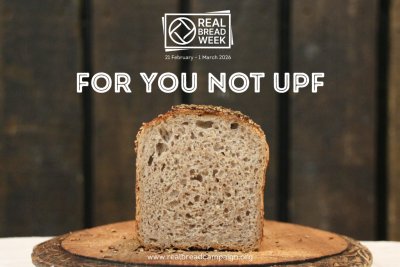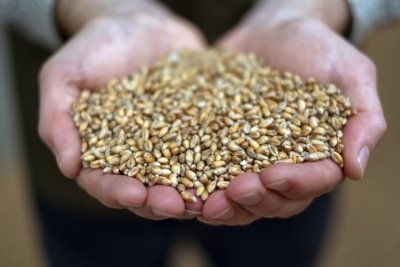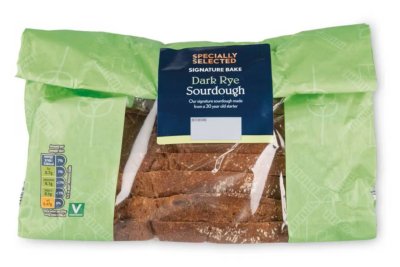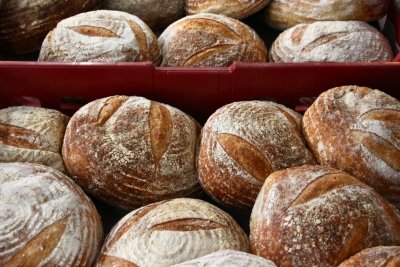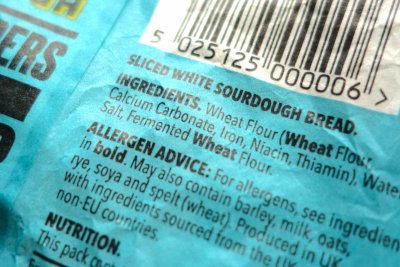 A preservative in disguise?. Credit: Chris Young / www.realbreadcampaign.org / Canva CC-BY-SA-4.0
A preservative in disguise?. Credit: Chris Young / www.realbreadcampaign.org / Canva CC-BY-SA-4.0
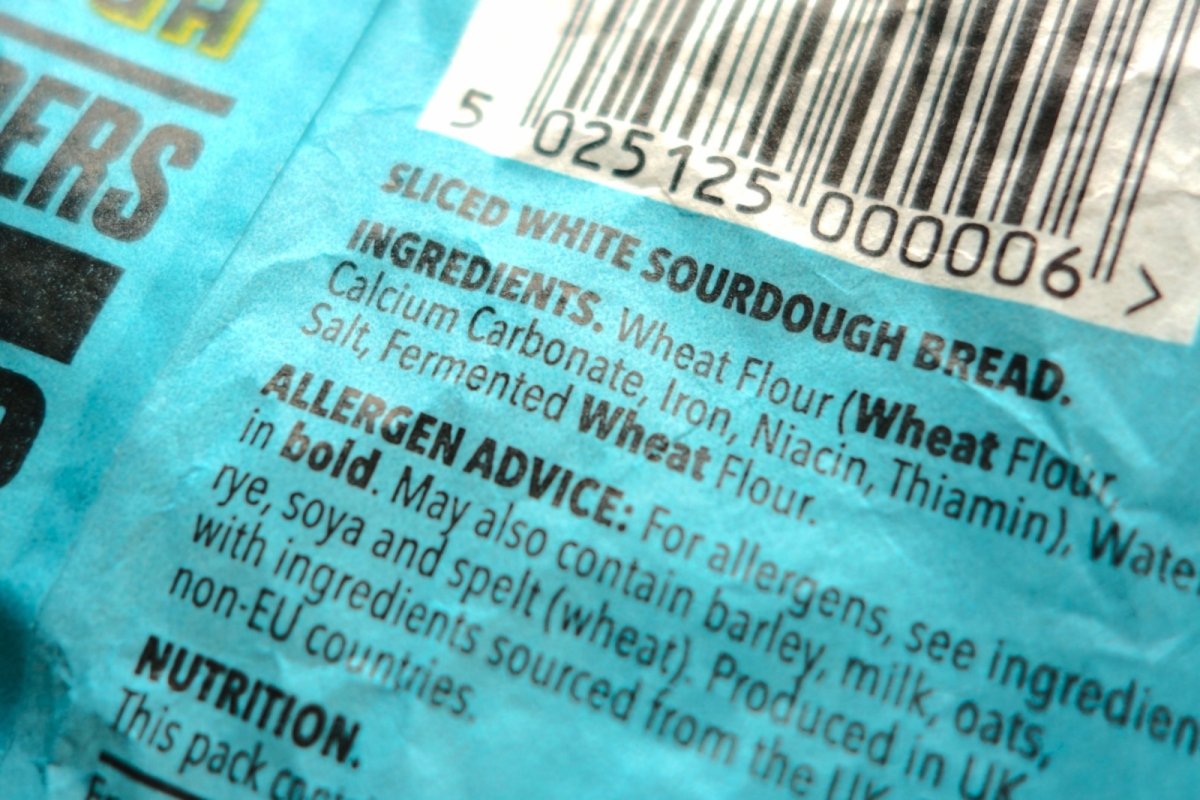
Dirty secret behind factory loaf 'clean labels'?
Millions of supermarket loaves might hide a preservative in plain sight.
Real Bread Campaign research published this Sourdough September reveals that some of the UK’s largest industrial dough fabricators may be adding propionic acid to some products but not naming it as such on ingredients lists.
Responding to people’s wariness of ultra processed food (UPF) being triggered by artificial preservatives, such as calcium propionate (E282) and potassium sorbate (E202), appearing on ingredients lists, some large manufacturers are turning to ‘clean label solutions’. One of these is using flour treated with a specific bacterium (such as Propionibacterium freudenreichii) to generate propionic acid but (legally) listing it simply as ‘fermented wheat flour’.
Brands
The Campaign looked at wrapped loaves manufactured for the UK’s 10 largest supermarket chains and by six of the highest-profile brands. The research found ‘fermented wheat flour’ listed in one or more products sold in the name of:
- Aldi, Asda, The Co-op, Iceland, Lidl, M&S, Morrisons, Sainsbury's, Tesco and Waitrose
- Allinson’s, Hovis, Jackson’s of Yorkshire, Jason’s Sourdough, Kingsmill and Warburtons
Aldi, Allinson’s, Jackson’s and Warburtons used the promise ‘no artificial preservatives’ as a marketing claim, while Jason's Sourdough promised 'no preservatives' on the pack of at least one product containing 'fermented wheat flour'.
On 21 August 2025, the Campaign wrote to all 16 companies, asking each to confirm whether ‘fermented wheat flour’ on their product labels denoted:
- a live sourdough starter culture
- a sourdough starter culture that's been dried and treated to end microbial activity
- flour fermented to generate propionic acid or
- something else
To be clear, the Campaign is not stating or implying that any of the 16 companies is breaching any regulatory requirement or restriction on the listing of ingredients, additives or processing aids.
Responses
On 2 September, Asda confirmed that 'fermented wheat flour' “typically refers to flour fermented to generate propionic acid. This process is used to enhance flavour and shelf life, and it does not involve a live sourdough culture.”
After the Campaign had followed up responses, this is a summary of the others received by 8 September 2025:
- Aldi: “Fermented wheat flour is made by fermenting wheat flour with specific bacteria.”*
- Hovis: “'information regarding our recipes are confidential, so we're unable to answer your questions. Hope you understand.”
- Jason’s Sourdough: “We are not going to share any information on our products with any 3rd parties.
- M&S: ”As we do not currently have the specific information available, we’ve raised your query to our Food Technology team for clarification.”
- Morrisons: “Our current specification with the supplier does not include details about the specific strain of bacteria used, so unfortunately, we’re unable to confirm this.”*
- Waitrose: “fermented wheat flour refers to an acidic free flowing powder delivered from dehydrating wheat based sourdough.”*
Iceland, Lidl and Tesco had sent holding responses that did not answer the question. Allinson’s, Co-op, Jackson’s of Yorkshire, Kingsmill and Warburtons had not responded.
* = The Campaign followed up by asking directly if the flour was fermented to produce propionic acid.
Jump to further responses and other updates
Honesty, trust and choice
Real Bread Campaign coordinator, Chris Young, said: “Though listing ‘fermented flour’ may be factually correct, it might not be the whole truth. We say ‘always read the label’ but what if people can’t even trust that? While silence isn’t an admission of guilt, the lack of a straight – or any – answer from some companies to a simple question has left us wondering.”
He went on to say: “We all have the right to know what goes into food so we have the chance to make better-informed choices about what we buy, eat and feed to our families. If a company slips propionic acid into a product but chooses not to declare the fact, we believe it to be misleading by omission.”
The Campaign urges the government to close this loophole in labelling law, and manufacturers to become voluntarily fully transparent in the meantime. This is in addition to ongoing lobbying for an Honest Crust Act of updated and improved composition, labelling and marketing standards.
***ENDS***
Some of the 16 brands listed ‘fermented wheat flour’ in more than one product, though none of the companies necessarily adds it to every product in its range. The Campaign’s research was a snapshot, beyond which other companies might also be employing ‘clean label solutions’.
The Campaign wrote to each company via the customer service email address or contact form published on its website. Where none was provided, the Campaign sent a direct message via Instagram.
Unnecessary additives
While additives can serve technical functions, by definition none is necessary. The Campaign is keen to stress that no artificial preservative or other additive is ever used in bread making. If any additive is used, the result is what we call an industrial dough product.
Updates
January 2026: We continue to ask the companies the question.
17 December 2025: Aldi confirmed the 'fermented wheat flour' in the chain’s own brand products is not a sourdough starter culture that makes the dough rise. The company advised that the functional ingredient is instead flour cultured using specific bacteria that generate propionic acid (or other organic acids), used to delay staling and / or inhibit mould growth in order to extend product durability (shelf life).
10 December 2025: We sent direct messages on Instagram to Aldi, Allinson’s, The Co-op, Hovis, Iceland, Jackson’s of Yorkshire, Kingsmill, Lidl, M&S, Morrisons, Sainsbury's, Tesco and Waitrose and Warburtons.
We asked each company: "Is the 'fermented wheat flour' listed on your own-brand loaves etc. the sourdough starter culture that makes the dough rise; flour fermented using specific bacteria that generate propionic acid (or other organic acids), used to delay staling and / or inhibit mould growth in order to extend product durability (shelf life); or something else?"
3 November 2025: We received an email containing a copy of correspondence with Jason's Sourdough. In it the company stated that the 'fermented wheat flour' does generate propionic acid, which has a preservative function. Rather than the outright 'NO preservatives' claim Jason's Sourdough makes on product packaging, the message contained the statement: 'it occurs naturally in the process - hence why we say no added preservatives.' We also noted different wording in the company's messaging on social media 'no artificial preservatives' [our italics]. It is still unlcear whether the 'fermented wheat flour' is just a sourdough starter culture, or used in addition to one.
We still look forward to receiving unequivocal answers to question from Aldi, Allinson’s, The Co-op, Hovis, Iceland, Jackson’s of Yorkshire, Kingsmill, Lidl, M&S, Morrisons, Sainsbury's, Tesco, Waitrose and Warburtons.
15 October 2025: We learned that the Federation of Bakers had published a statement confirming that 'fermented wheat flour' on a label means a preservative, used to inhibit mould and extend shelf life.
22 September 2025: In response to a reel we posted on Instagram and Facebook, Jason's Sourdough posted a statement. In it, the company asserted that they used 'fermented wheat flour' in all of their products. 'This fermentation process produces natural organic acids and metabolites. It is not an additive and not an added E-number.' The statement did not include a direct, yes or no answer to the question: 'is the "fermented wheat flour" you add cultured using specific bacteria to generate propionic acid?'
8 September 2025: Tesco replied to our Instagram direct message: 'We won’t be able to disclose that kind of information as it is confidential. I'm sorry that I couldn't be of more assistance to you on this occasion.'
Real Bread Campaign: Finding and sharing ways to make bread better for us, our communities and planet.
Sustain
The Green House
244-254 Cambridge Heath Road
London E2 9DA
020 3559 6777
sustain@sustainweb.org
Sustain advocates food and agriculture policies and practices that enhance the health and welfare of people and animals, improve the working and living environment, promote equity and enrich society and culture.
© Sustain 2026
Registered charity (no. 1018643)
Data privacy & cookies
Icons by Icons8

